Unit 3 Science versus nature过去分词课件
文档属性
| 名称 | Unit 3 Science versus nature过去分词课件 | 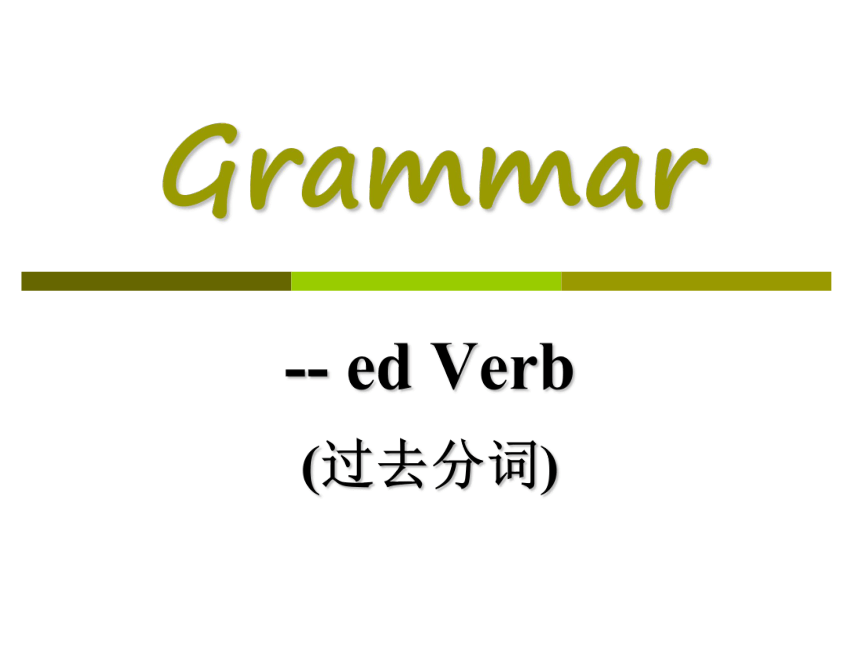 | |
| 格式 | zip | ||
| 文件大小 | 435.7KB | ||
| 资源类型 | 教案 | ||
| 版本资源 | 牛津译林版 | ||
| 科目 | 英语 | ||
| 更新时间 | 2014-08-12 22:56:19 | ||
图片预览

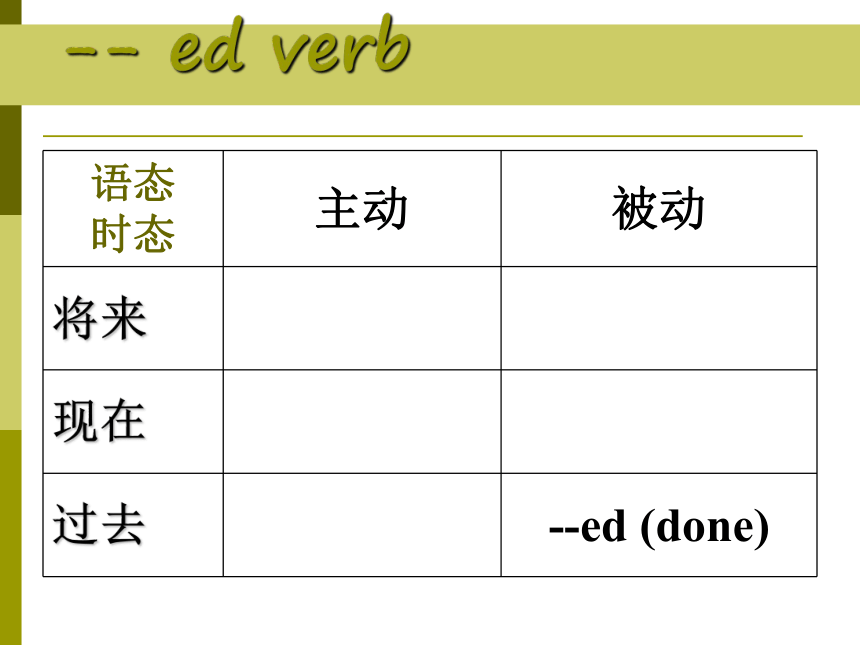
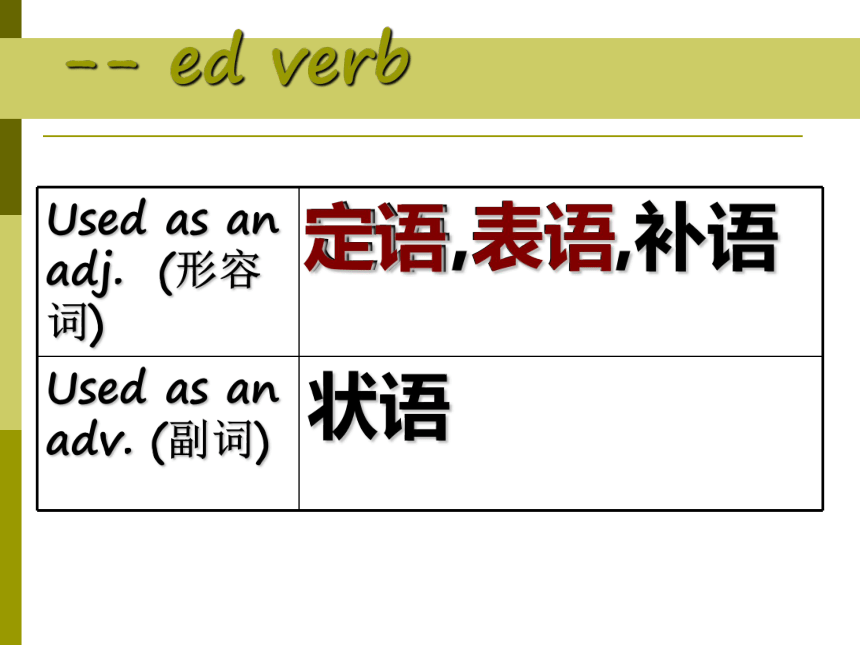
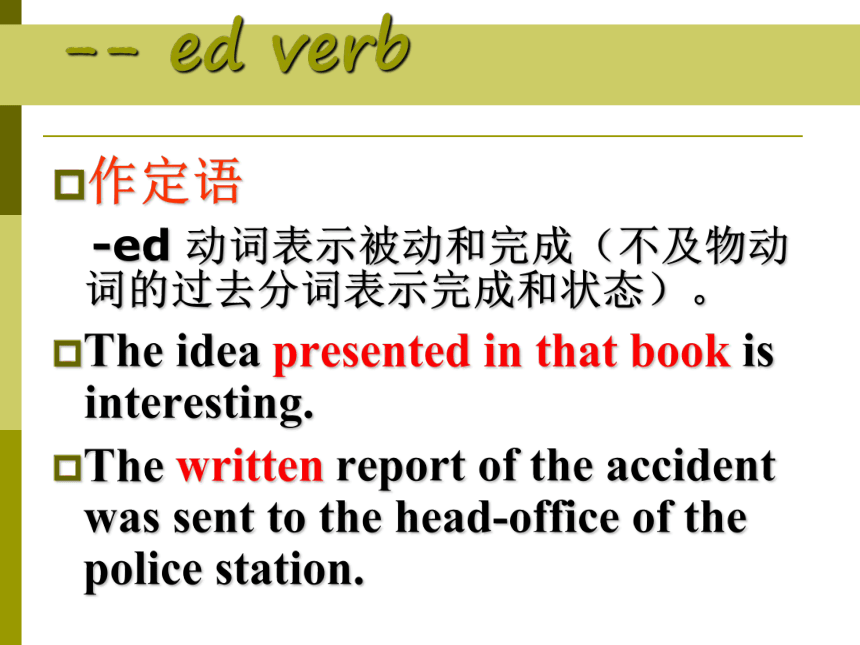
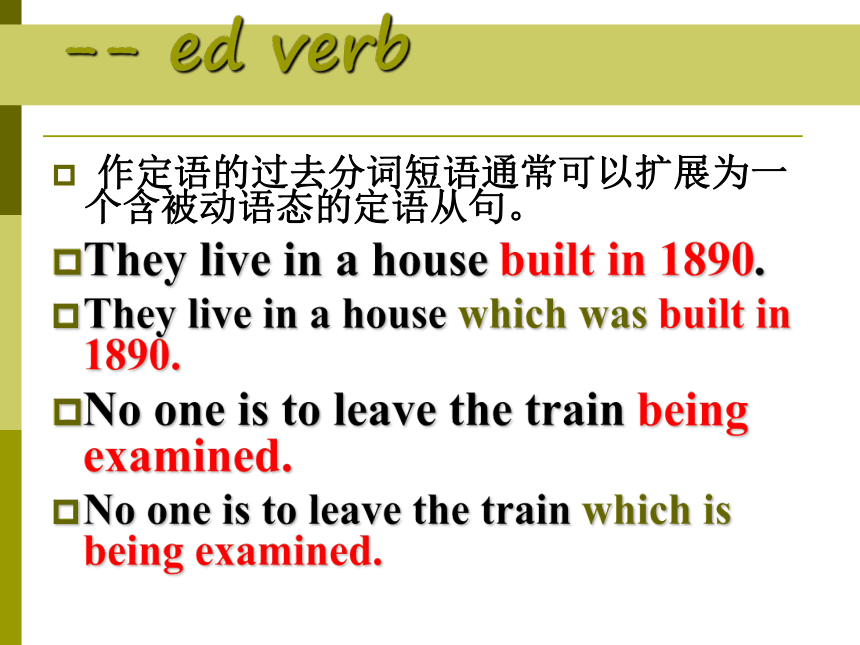
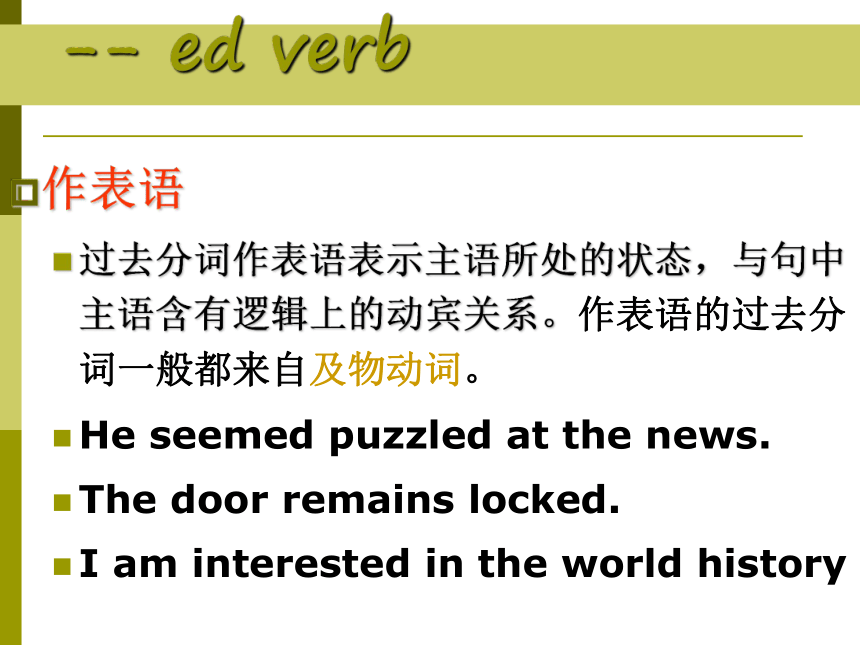
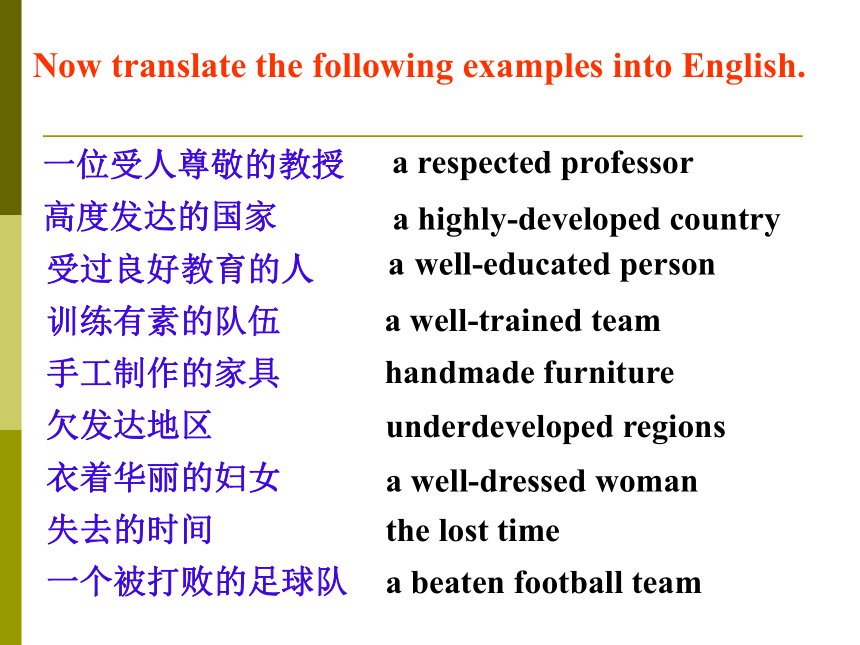
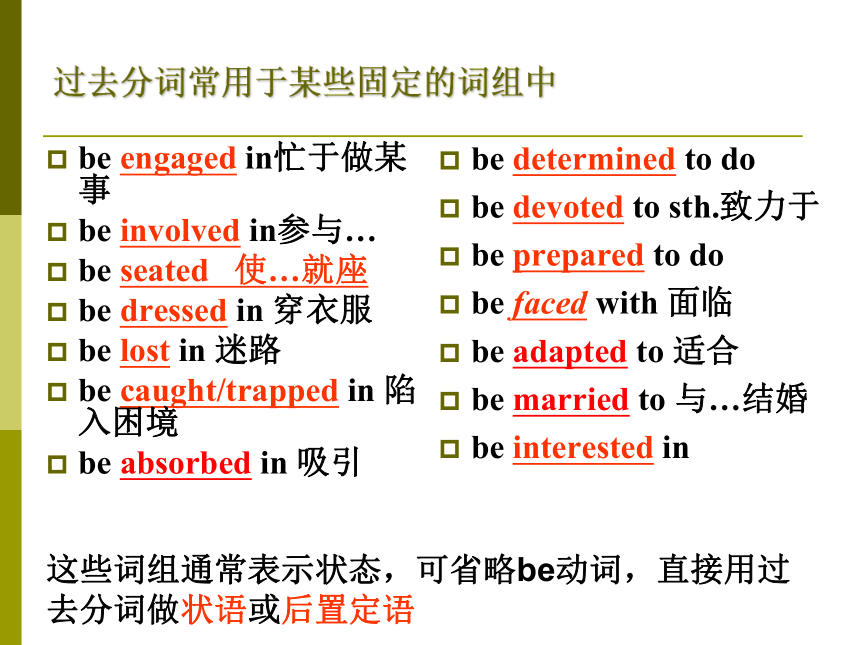
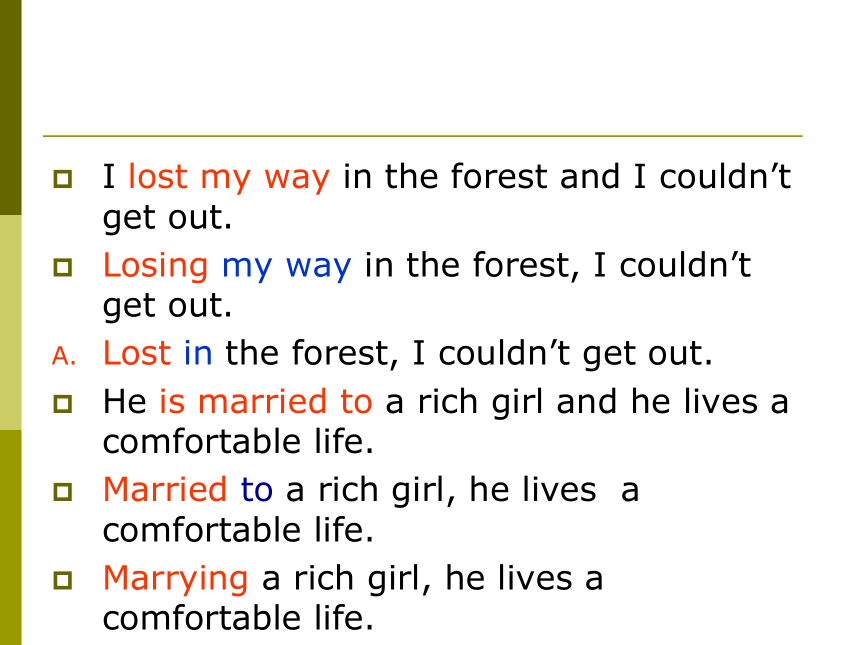
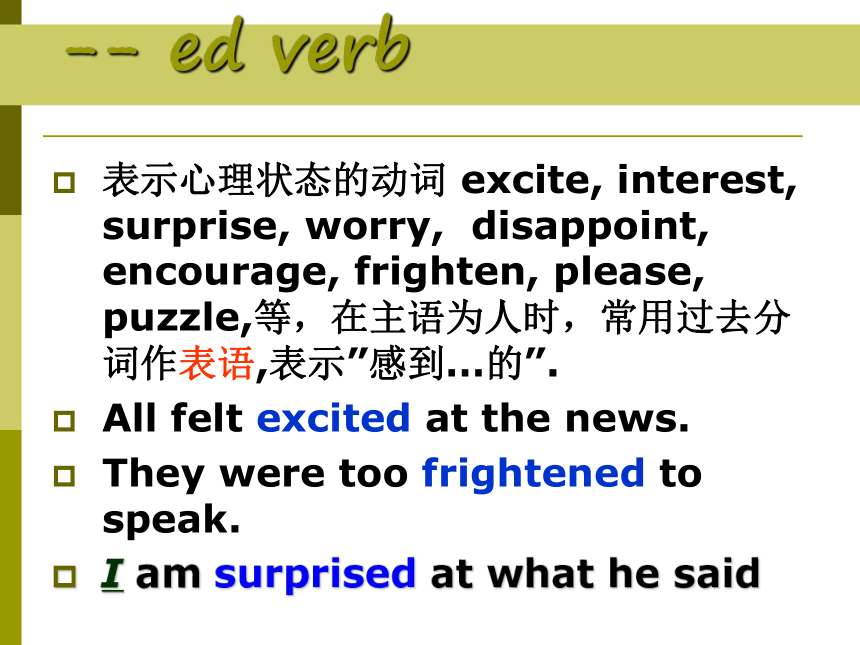
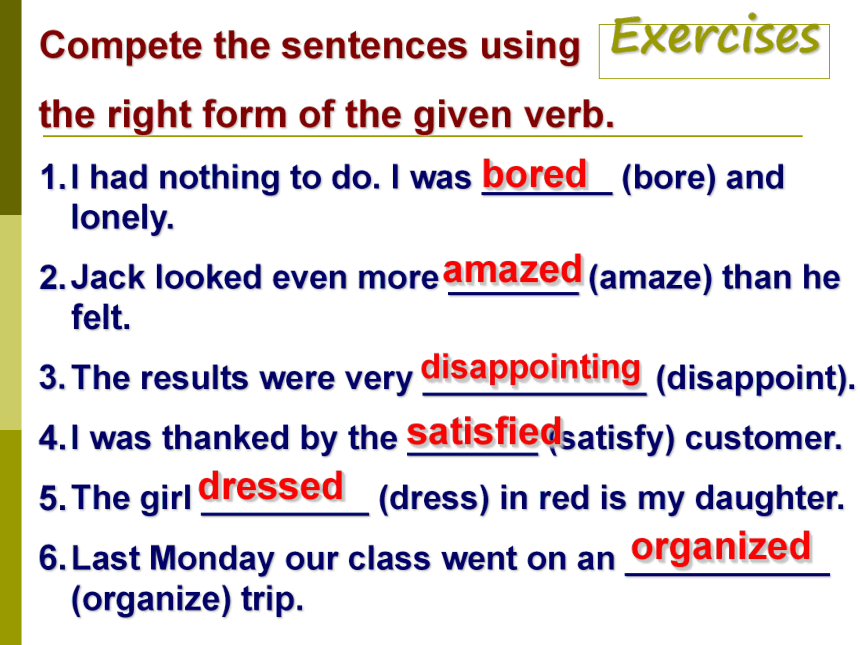
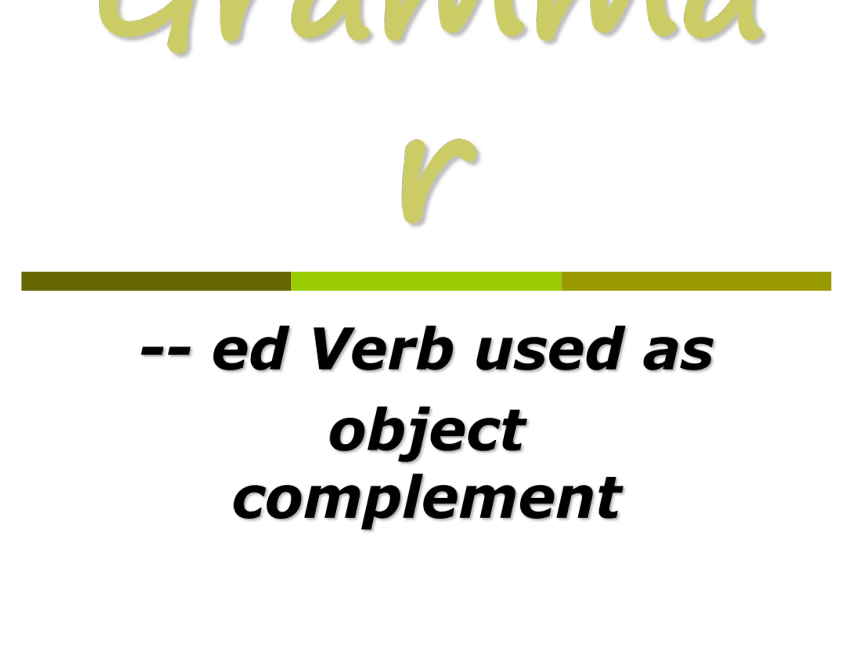
文档简介
课件55张PPT。Grammar-- ed Verb
(过去分词) -- ed verb -- ed verb 定语表语作定语
-ed 动词表示被动和完成(不及物动词的过去分词表示完成和状态)。
The idea presented in that book is interesting.
The written report of the accident was sent to the head-office of the police station. -- ed verb 作定语的过去分词短语通常可以扩展为一个含被动语态的定语从句。
They live in a house built in 1890.
They live in a house which was built in 1890.
No one is to leave the train being examined.
No one is to leave the train which is being examined. -- ed verb 作表语
过去分词作表语表示主语所处的状态,与句中主语含有逻辑上的动宾关系。作表语的过去分词一般都来自及物动词。
He seemed puzzled at the news.
The door remains locked.
I am interested in the world history -- ed verb Now translate the following examples into English. 一位受人尊敬的教授
高度发达的国家a respected professor a highly-developed country受过良好教育的人
训练有素的队伍
手工制作的家具
欠发达地区
衣着华丽的妇女
失去的时间
一个被打败的足球队a well-educated person a well-trained teamhandmade furniture underdeveloped regions a well-dressed woman the lost time a beaten football team 过去分词常用于某些固定的词组中be engaged in忙于做某事
be involved in参与…
be seated 使…就座
be dressed in 穿衣服
be lost in 迷路
be caught/trapped in 陷入困境
be absorbed in 吸引
be determined to do
be devoted to sth.致力于
be prepared to do
be faced with 面临
be adapted to 适合
be married to 与…结婚
be interested in
这些词组通常表示状态,可省略be动词,直接用过去分词做状语或后置定语I lost my way in the forest and I couldn’t get out.
Losing my way in the forest, I couldn’t get out.
Lost in the forest, I couldn’t get out.
He is married to a rich girl and he lives a comfortable life.
Married to a rich girl, he lives a comfortable life.
Marrying a rich girl, he lives a comfortable life.表示心理状态的动词 excite, interest, surprise, worry, disappoint, encourage, frighten, please, puzzle,等,在主语为人时,常用过去分词作表语,表示”感到…的”.
All felt excited at the news.
They were too frightened to speak.
I am surprised at what he said
-- ed verb Compete the sentences using
the right form of the given verb.
I had nothing to do. I was _______ (bore) and lonely.
Jack looked even more _______ (amaze) than he felt.
The results were very ____________ (disappoint).
I was thanked by the _______ (satisfy) customer.
The girl _________ (dress) in red is my daughter.
Last Monday our class went on an ___________ (organize) trip. bored amazed disappointing satisfied dressed organizedExercises Grammar -- ed Verb used as
object complement -- ed verb 补语 -- ed verb -ed verb (过去分词)作宾语补足语用作宾语补足语的过去分词一般是及物动词,表示被动或已完成的意思,有时候两者兼而有之。作宾语补足语的过去分词与宾语有逻辑上的动宾关系,即宾语是过去分词动作的对象。如:
He never heard the song sung in English. 在 make / have 后的宾语补足语
a.表示“让某人使某人或组织某人做某事”
He raised his voice to make himself heard.
Excuse me, madam. I ‘d like to have this package weighed. -ed verb (过去分词)作宾语补足语We'll have the house painted.
He can't make his points understood.
I have had my bike repaired.
b. 表示“遭遇到某种不幸;受到打击”等。
She had her money stolen.
Tom had his leg broken. -ed verb (过去分词)作宾语补足语B. 在其他动词后作宾语补足语:
I must get my hair cut.
I want the work done quickly.
He left the work unfinished.
She found the door broken in when she came back. -ed verb (过去分词)作宾语补足语They kept the door locked for a long time.
The boss wouldn’t like the problem discussed at the moment.
He wanted the suit made to his own measure.-ed verb (过去分词)作宾语补足语C. 感观动词后的宾补
常见的感观动词有:see, watch, observe, look at, notice, feel, listen to, hear, etc,后用-ing verb表示主动和进行,-ed verb表示被动和完成,不带to的不定式(动词原形)表示主动和完成或全过程。
They knew her very well. They had seen her grow up from a child. -- ed verb I saw John fall off the horse.
He was heard to say that the minister had been bribed.
We could hear the rain falling on the roof.
While waiting for my plane, I watched other planes landing and taking off.
I heard him singing in his office yesterday.
I heard the song sung in English many times.-ed verb (过去分词)作宾语补足语D. 用于With 结构中
这一结构中,过去分词与宾语之间是
动宾关系。
with+宾语+宾补(过去分词)
The murderer was brought in with his hands tied behind his back.1. ______ poor at English, I’m afraid I can’t make myself ______.
A. To be; understand
B. I’m; to understand
C. Being; understanding
D. Being; understood D2. I have had my bike ______, and
I’m going to have somebody
______ my radio tomorrow.
A. repair; to repair
B. repairing; to be repaired
C. repaired; repair
D. to repair; repairing C3. You must get the work ______ before Friday.
A. do B. to do
C. doing D. done D4. ______ the room, the nurse
found the tape-recorder ______ .
A. Entering; stealing
B. Entering; gone
C. To have entered; being stolen
D. Having entered; to be stolen B5.We are pleased to see the
problem ______ so quickly.
A. settled
B. having been settled
C. be settled
D. settling AGrammar-- ed verb used as adverbial -- ed verb 状语--ed Verb 作状语 过去分词作状语,表示被动的动作,或已经完成的动作。可以用来表示时间、原因、让步、条件和伴随状况等。表示时间、原因等的分词短语相当于一个状语从句. 例如:
Seen from the hill, the park looks very beautiful.
When it is seen from the hill, the park looks very beautiful.
Although left alone at home, Sam didn’t feel afraid at all.
Once translated into Chinese, the book became very popular in China.
The semester finished, I am going to rest a few days and then take a trip. --ed Verb 作状语 为使分词短语与主句关系更
清楚,有时可在分词前加连词
when,while,if though,after, before, as 等.
但分词的主语和主句的主语必
须为同一个。You’d better not speak until you are spoken to.
Until spoken to, you’d better not speak.
When the boy was told to go to bed, he started to cry.
When told to go to bed, the boy started to cry.1. 时间状语2.原因状语Because the boy was greatly touched by his teacher’s words, he did a lot of things to help his classmates.
Greatly touched by the teacher’s words,
the boy did …..
As he was surprised at what happened, Tom didn’t know what to do.
Surprised at what happened, Tom
didn’t know …3.条件状语If we were given more time, we could do it much better.
Given more time, we could ….
2. If it is heated to a high temperature, water will change into vapor.
Heated to a high temperature, water will ….4. 让步状语Though they had been warned of the storm, the farmers were still working in the fields.
Though warned of the storm,
the farmers were ….
2. Even if I’m invited, I won’t take part in
the party.
Even if invited, I won’t take …5. 方式、伴随状语1. The teacher entered the classroom, and he was followed by a group of students.
Followed by a group of students, the teacher ….
2. She was surrounded by so many flowers and she was too happy to say a word.
Surrounded by so many flowers, she was too happy to say a word.
选择现在分词还是过去分词,关键看主句的主语。如分词的动作是主句的主语发出,分词就选用现在分词,反之就用过去分词。例如:
Used for a long time, the book looks old.
由于用了很长时间,这本书看上去很旧。
Using the book, I find it useful.
在使用的过程中,我发现这本书很有用
现在分词与过去分词的区别现在分词与过去分词他们都属于分词,是非谓语动词的一种表现形式,不能作谓语动词使用。现在分词的表现形式是:v+ing,过去分词的表现形式是:v+ed (包括一些动词的不规则变化形式)。在句中主要起到形容词和副词的作用,可作定语、表语、补足语及状语。分词否定结构 not + v-ing/v-edThe bridge had been weakened by the successive storms, and it was no longer safe.
The village is surrounded by mountains and it has a peaceful atmosphere.
Paris is dominated by the Eiffel Tower. Paris is well known for its architecture.
The hotel is sheltered by trees on either side. It is a favourite with people who want a quiet holiday. Re-write the sentences:Weakened by the successive storms, the bridge was no longer safe.
Surrounded by mountains, the village has a peaceful atmosphere.
Dominated by the Eiffel Tower, Paris is well known for its architecture.
Sheltered by trees on either side, the hotel is a favourite with people who want a quiet holiday.
独立主格结构。分词作状语时,逻辑主语一般必须与句子的主语一致。但有时它也可以有自己的独立的逻辑主语,这种结构成为独立主格结构。作用于分词作状语一样,在句中表示各种状语。
She stood there, her head leaning on the tree.(名词+现在分词)
Night coming on, we started for home. (名词+现在分词)
So many people (being) absent, they decided to put the meeting off. (名词+形容词)
Weather permitting, we’ll go there on foot。 (名词+现在分词)
There being no buses, we had to walk home. (名词+现在分词)
The meeting (being) over, the audience left the meeting room. (名词+副词)
Her tea finished , she went on with her work. (名词+过去分词)
The teacher came in,
With复合结构也是一种独立主格结构with a book under his arm.
a book in his hand a book in handExercises 请用非谓语动词填空1.After a whole day’s heavy work, the old worker returned home, hungry and __________(exhaust).
2._________(dress) in a fur coat, she entered the shop the next morning.
3._________(give ) another chance, I’ll do it better.
4._____ (lose) in the fog, we were forced to spend two hours in the woods.exhaustedDressedGivenLost5._______ (find) in the forest, the _____ (lost) boy was already _______(tire) out.Foundlostthinking6.I saw him ______(seat) behind the tree, __________( think).seatedtired7.The cake was left __________(untouch) on the table.untouched8.Once ______ (see), it can never be forgotten. seenExercises:____ some officials, Napoleon
inspected his army. Following B. Followed by
C. Being followed D. having been followed2. There was a terrible noise ___ the sudden burst of light. followed B. following
C. to be followed D. being followedBB3. The next morning she found the
man ___ in bed, dead. lying B. lie
C. lay D. laying4. I can hardly imagine Peter ___ across the Atlantic Ocean in five days. sail B. sailing
C. to sail D. to have sailedAB5. ___ his head high, the manager walked into the room to attend the meeting ___ then. Holding; being held B. Held; holding
C. Having held; held D. Held; to be held6. ___, but he still could not understand it. Told many times
B. Having been told many times
C. He has been told many times
D. Though he had been told many timesAC7. ___ a reply, he decided to write again. Not receiving B. Receiving not
C. Not having received D. Having not received8. The visiting minister expressed his
satisfaction in his talks, ___ that he had
enjoyed his stay here. having added B. to add
C. adding D. addedCC9. Don’t get you schedule ___, stay with
us in this class. to change B. changing
C. changed D. change10. European football is played in 80 countries, ___ it the most popular sport in the world. making B. makes
C. made D. to makeCA11. The murderer was brought in, with
his hands ___ behind his back. being tied B. having tied
C. to be tied D. tied12. ___ more attention, the trees could have grown better. Given B. To give
C. Giving D. Having givenDA13. The ___ morning, the father came into the lonely house, ___ by his naughty boy. following, following B. followed, followed
C. following, followed D. followed, following14. Mrs. White was glad to see the nurse ___ after her son and was pleased to see the boy well ___ care of in the nursery. looked; taken B. looking; taken
C. looked; took D. looking; takingCBThank you for your co-operation!
(过去分词) -- ed verb -- ed verb 定语表语作定语
-ed 动词表示被动和完成(不及物动词的过去分词表示完成和状态)。
The idea presented in that book is interesting.
The written report of the accident was sent to the head-office of the police station. -- ed verb 作定语的过去分词短语通常可以扩展为一个含被动语态的定语从句。
They live in a house built in 1890.
They live in a house which was built in 1890.
No one is to leave the train being examined.
No one is to leave the train which is being examined. -- ed verb 作表语
过去分词作表语表示主语所处的状态,与句中主语含有逻辑上的动宾关系。作表语的过去分词一般都来自及物动词。
He seemed puzzled at the news.
The door remains locked.
I am interested in the world history -- ed verb Now translate the following examples into English. 一位受人尊敬的教授
高度发达的国家a respected professor a highly-developed country受过良好教育的人
训练有素的队伍
手工制作的家具
欠发达地区
衣着华丽的妇女
失去的时间
一个被打败的足球队a well-educated person a well-trained teamhandmade furniture underdeveloped regions a well-dressed woman the lost time a beaten football team 过去分词常用于某些固定的词组中be engaged in忙于做某事
be involved in参与…
be seated 使…就座
be dressed in 穿衣服
be lost in 迷路
be caught/trapped in 陷入困境
be absorbed in 吸引
be determined to do
be devoted to sth.致力于
be prepared to do
be faced with 面临
be adapted to 适合
be married to 与…结婚
be interested in
这些词组通常表示状态,可省略be动词,直接用过去分词做状语或后置定语I lost my way in the forest and I couldn’t get out.
Losing my way in the forest, I couldn’t get out.
Lost in the forest, I couldn’t get out.
He is married to a rich girl and he lives a comfortable life.
Married to a rich girl, he lives a comfortable life.
Marrying a rich girl, he lives a comfortable life.表示心理状态的动词 excite, interest, surprise, worry, disappoint, encourage, frighten, please, puzzle,等,在主语为人时,常用过去分词作表语,表示”感到…的”.
All felt excited at the news.
They were too frightened to speak.
I am surprised at what he said
-- ed verb Compete the sentences using
the right form of the given verb.
I had nothing to do. I was _______ (bore) and lonely.
Jack looked even more _______ (amaze) than he felt.
The results were very ____________ (disappoint).
I was thanked by the _______ (satisfy) customer.
The girl _________ (dress) in red is my daughter.
Last Monday our class went on an ___________ (organize) trip. bored amazed disappointing satisfied dressed organizedExercises Grammar -- ed Verb used as
object complement -- ed verb 补语 -- ed verb -ed verb (过去分词)作宾语补足语用作宾语补足语的过去分词一般是及物动词,表示被动或已完成的意思,有时候两者兼而有之。作宾语补足语的过去分词与宾语有逻辑上的动宾关系,即宾语是过去分词动作的对象。如:
He never heard the song sung in English. 在 make / have 后的宾语补足语
a.表示“让某人使某人或组织某人做某事”
He raised his voice to make himself heard.
Excuse me, madam. I ‘d like to have this package weighed. -ed verb (过去分词)作宾语补足语We'll have the house painted.
He can't make his points understood.
I have had my bike repaired.
b. 表示“遭遇到某种不幸;受到打击”等。
She had her money stolen.
Tom had his leg broken. -ed verb (过去分词)作宾语补足语B. 在其他动词后作宾语补足语:
I must get my hair cut.
I want the work done quickly.
He left the work unfinished.
She found the door broken in when she came back. -ed verb (过去分词)作宾语补足语They kept the door locked for a long time.
The boss wouldn’t like the problem discussed at the moment.
He wanted the suit made to his own measure.-ed verb (过去分词)作宾语补足语C. 感观动词后的宾补
常见的感观动词有:see, watch, observe, look at, notice, feel, listen to, hear, etc,后用-ing verb表示主动和进行,-ed verb表示被动和完成,不带to的不定式(动词原形)表示主动和完成或全过程。
They knew her very well. They had seen her grow up from a child. -- ed verb I saw John fall off the horse.
He was heard to say that the minister had been bribed.
We could hear the rain falling on the roof.
While waiting for my plane, I watched other planes landing and taking off.
I heard him singing in his office yesterday.
I heard the song sung in English many times.-ed verb (过去分词)作宾语补足语D. 用于With 结构中
这一结构中,过去分词与宾语之间是
动宾关系。
with+宾语+宾补(过去分词)
The murderer was brought in with his hands tied behind his back.1. ______ poor at English, I’m afraid I can’t make myself ______.
A. To be; understand
B. I’m; to understand
C. Being; understanding
D. Being; understood D2. I have had my bike ______, and
I’m going to have somebody
______ my radio tomorrow.
A. repair; to repair
B. repairing; to be repaired
C. repaired; repair
D. to repair; repairing C3. You must get the work ______ before Friday.
A. do B. to do
C. doing D. done D4. ______ the room, the nurse
found the tape-recorder ______ .
A. Entering; stealing
B. Entering; gone
C. To have entered; being stolen
D. Having entered; to be stolen B5.We are pleased to see the
problem ______ so quickly.
A. settled
B. having been settled
C. be settled
D. settling AGrammar-- ed verb used as adverbial -- ed verb 状语--ed Verb 作状语 过去分词作状语,表示被动的动作,或已经完成的动作。可以用来表示时间、原因、让步、条件和伴随状况等。表示时间、原因等的分词短语相当于一个状语从句. 例如:
Seen from the hill, the park looks very beautiful.
When it is seen from the hill, the park looks very beautiful.
Although left alone at home, Sam didn’t feel afraid at all.
Once translated into Chinese, the book became very popular in China.
The semester finished, I am going to rest a few days and then take a trip. --ed Verb 作状语 为使分词短语与主句关系更
清楚,有时可在分词前加连词
when,while,if though,after, before, as 等.
但分词的主语和主句的主语必
须为同一个。You’d better not speak until you are spoken to.
Until spoken to, you’d better not speak.
When the boy was told to go to bed, he started to cry.
When told to go to bed, the boy started to cry.1. 时间状语2.原因状语Because the boy was greatly touched by his teacher’s words, he did a lot of things to help his classmates.
Greatly touched by the teacher’s words,
the boy did …..
As he was surprised at what happened, Tom didn’t know what to do.
Surprised at what happened, Tom
didn’t know …3.条件状语If we were given more time, we could do it much better.
Given more time, we could ….
2. If it is heated to a high temperature, water will change into vapor.
Heated to a high temperature, water will ….4. 让步状语Though they had been warned of the storm, the farmers were still working in the fields.
Though warned of the storm,
the farmers were ….
2. Even if I’m invited, I won’t take part in
the party.
Even if invited, I won’t take …5. 方式、伴随状语1. The teacher entered the classroom, and he was followed by a group of students.
Followed by a group of students, the teacher ….
2. She was surrounded by so many flowers and she was too happy to say a word.
Surrounded by so many flowers, she was too happy to say a word.
选择现在分词还是过去分词,关键看主句的主语。如分词的动作是主句的主语发出,分词就选用现在分词,反之就用过去分词。例如:
Used for a long time, the book looks old.
由于用了很长时间,这本书看上去很旧。
Using the book, I find it useful.
在使用的过程中,我发现这本书很有用
现在分词与过去分词的区别现在分词与过去分词他们都属于分词,是非谓语动词的一种表现形式,不能作谓语动词使用。现在分词的表现形式是:v+ing,过去分词的表现形式是:v+ed (包括一些动词的不规则变化形式)。在句中主要起到形容词和副词的作用,可作定语、表语、补足语及状语。分词否定结构 not + v-ing/v-edThe bridge had been weakened by the successive storms, and it was no longer safe.
The village is surrounded by mountains and it has a peaceful atmosphere.
Paris is dominated by the Eiffel Tower. Paris is well known for its architecture.
The hotel is sheltered by trees on either side. It is a favourite with people who want a quiet holiday. Re-write the sentences:Weakened by the successive storms, the bridge was no longer safe.
Surrounded by mountains, the village has a peaceful atmosphere.
Dominated by the Eiffel Tower, Paris is well known for its architecture.
Sheltered by trees on either side, the hotel is a favourite with people who want a quiet holiday.
独立主格结构。分词作状语时,逻辑主语一般必须与句子的主语一致。但有时它也可以有自己的独立的逻辑主语,这种结构成为独立主格结构。作用于分词作状语一样,在句中表示各种状语。
She stood there, her head leaning on the tree.(名词+现在分词)
Night coming on, we started for home. (名词+现在分词)
So many people (being) absent, they decided to put the meeting off. (名词+形容词)
Weather permitting, we’ll go there on foot。 (名词+现在分词)
There being no buses, we had to walk home. (名词+现在分词)
The meeting (being) over, the audience left the meeting room. (名词+副词)
Her tea finished , she went on with her work. (名词+过去分词)
The teacher came in,
With复合结构也是一种独立主格结构with a book under his arm.
a book in his hand a book in handExercises 请用非谓语动词填空1.After a whole day’s heavy work, the old worker returned home, hungry and __________(exhaust).
2._________(dress) in a fur coat, she entered the shop the next morning.
3._________(give ) another chance, I’ll do it better.
4._____ (lose) in the fog, we were forced to spend two hours in the woods.exhaustedDressedGivenLost5._______ (find) in the forest, the _____ (lost) boy was already _______(tire) out.Foundlostthinking6.I saw him ______(seat) behind the tree, __________( think).seatedtired7.The cake was left __________(untouch) on the table.untouched8.Once ______ (see), it can never be forgotten. seenExercises:____ some officials, Napoleon
inspected his army. Following B. Followed by
C. Being followed D. having been followed2. There was a terrible noise ___ the sudden burst of light. followed B. following
C. to be followed D. being followedBB3. The next morning she found the
man ___ in bed, dead. lying B. lie
C. lay D. laying4. I can hardly imagine Peter ___ across the Atlantic Ocean in five days. sail B. sailing
C. to sail D. to have sailedAB5. ___ his head high, the manager walked into the room to attend the meeting ___ then. Holding; being held B. Held; holding
C. Having held; held D. Held; to be held6. ___, but he still could not understand it. Told many times
B. Having been told many times
C. He has been told many times
D. Though he had been told many timesAC7. ___ a reply, he decided to write again. Not receiving B. Receiving not
C. Not having received D. Having not received8. The visiting minister expressed his
satisfaction in his talks, ___ that he had
enjoyed his stay here. having added B. to add
C. adding D. addedCC9. Don’t get you schedule ___, stay with
us in this class. to change B. changing
C. changed D. change10. European football is played in 80 countries, ___ it the most popular sport in the world. making B. makes
C. made D. to makeCA11. The murderer was brought in, with
his hands ___ behind his back. being tied B. having tied
C. to be tied D. tied12. ___ more attention, the trees could have grown better. Given B. To give
C. Giving D. Having givenDA13. The ___ morning, the father came into the lonely house, ___ by his naughty boy. following, following B. followed, followed
C. following, followed D. followed, following14. Mrs. White was glad to see the nurse ___ after her son and was pleased to see the boy well ___ care of in the nursery. looked; taken B. looking; taken
C. looked; took D. looking; takingCBThank you for your co-operation!
